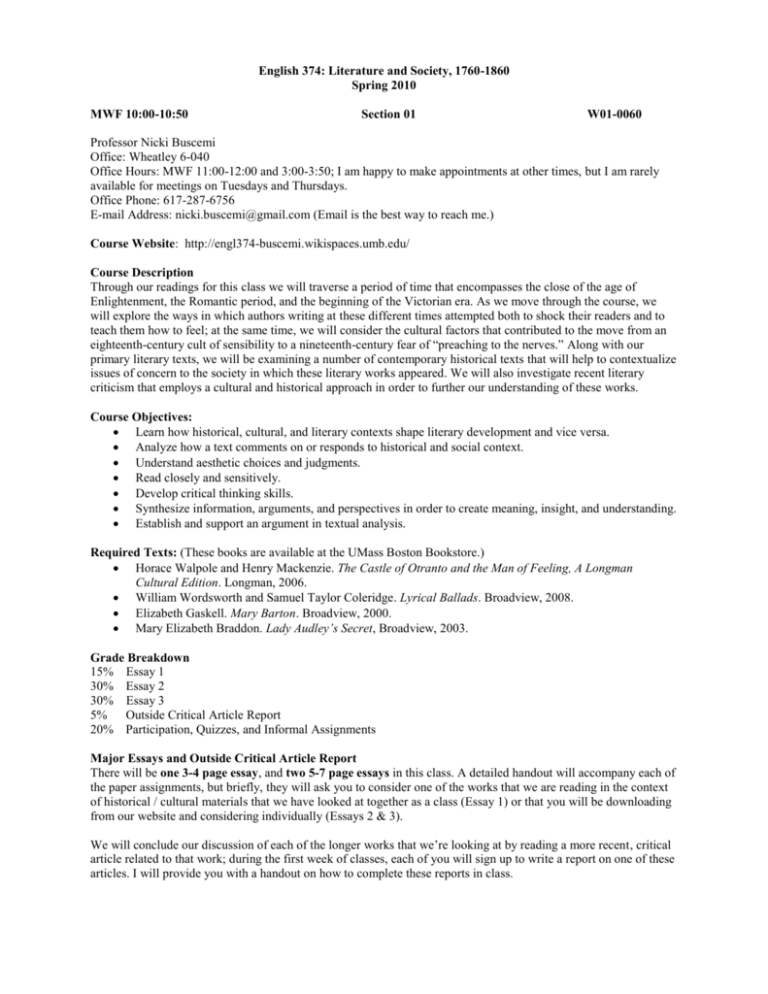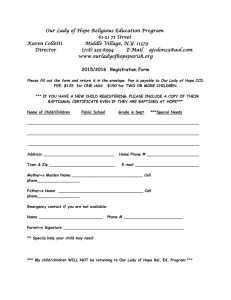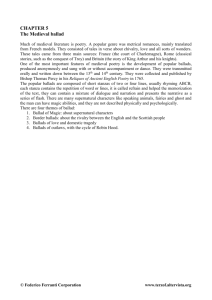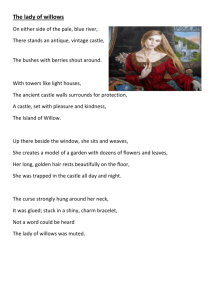English 374 Syllabus - Revised.doc - English 374
advertisement

English 374: Literature and Society, 1760-1860 Spring 2010 MWF 10:00-10:50 Section 01 W01-0060 Professor Nicki Buscemi Office: Wheatley 6-040 Office Hours: MWF 11:00-12:00 and 3:00-3:50; I am happy to make appointments at other times, but I am rarely available for meetings on Tuesdays and Thursdays. Office Phone: 617-287-6756 E-mail Address: nicki.buscemi@gmail.com (Email is the best way to reach me.) Course Website: http://engl374-buscemi.wikispaces.umb.edu/ Course Description Through our readings for this class we will traverse a period of time that encompasses the close of the age of Enlightenment, the Romantic period, and the beginning of the Victorian era. As we move through the course, we will explore the ways in which authors writing at these different times attempted both to shock their readers and to teach them how to feel; at the same time, we will consider the cultural factors that contributed to the move from an eighteenth-century cult of sensibility to a nineteenth-century fear of “preaching to the nerves.” Along with our primary literary texts, we will be examining a number of contemporary historical texts that will help to contextualize issues of concern to the society in which these literary works appeared. We will also investigate recent literary criticism that employs a cultural and historical approach in order to further our understanding of these works. Course Objectives: Learn how historical, cultural, and literary contexts shape literary development and vice versa. Analyze how a text comments on or responds to historical and social context. Understand aesthetic choices and judgments. Read closely and sensitively. Develop critical thinking skills. Synthesize information, arguments, and perspectives in order to create meaning, insight, and understanding. Establish and support an argument in textual analysis. Required Texts: (These books are available at the UMass Boston Bookstore.) Horace Walpole and Henry Mackenzie. The Castle of Otranto and the Man of Feeling, A Longman Cultural Edition. Longman, 2006. William Wordsworth and Samuel Taylor Coleridge. Lyrical Ballads. Broadview, 2008. Elizabeth Gaskell. Mary Barton. Broadview, 2000. Mary Elizabeth Braddon. Lady Audley’s Secret, Broadview, 2003. Grade Breakdown 15% Essay 1 30% Essay 2 30% Essay 3 5% Outside Critical Article Report 20% Participation, Quizzes, and Informal Assignments Major Essays and Outside Critical Article Report There will be one 3-4 page essay, and two 5-7 page essays in this class. A detailed handout will accompany each of the paper assignments, but briefly, they will ask you to consider one of the works that we are reading in the context of historical / cultural materials that we have looked at together as a class (Essay 1) or that you will be downloading from our website and considering individually (Essays 2 & 3). We will conclude our discussion of each of the longer works that we’re looking at by reading a more recent, critical article related to that work; during the first week of classes, each of you will sign up to write a report on one of these articles. I will provide you with a handout on how to complete these reports in class. Participation, Attendance, and Informal Assignments While I will provide some contextual lectures along the way, much of our time will be spent discussing what we have read as a class. Because these discussions will help us to become better at reading texts, refining our ideas, and expressing these ideas in both oral and written form, they are an integral component of this class’s (and your) success. Thus, it is essential that you complete the reading for each class and come prepared to talk about what you’ve read—failure to do so impedes your progress, and it is inconsiderate to your classmates. What I hope to see from each of you is a willingness to share your responses and questions about a text, courteous and thoughtful responses to others’ commentary, a high level of engagement with the text and the issues it raises, and the incorporation of earlier readings and discussions we have had. Please note: Cell phones should be off and headphones put away during class. Text messaging in class is not permitted. Failure to follow these policies will result in a lowering of your participation grade in this class. You may not miss more than 6 class sessions and pass the course. Missing more than 3 classes will negatively affect your grade. Persistent tardiness will also result in a lowering of your grade—3 tardies equal 1 absence. Emergencies will be considered on a case-by-case basis. Whatever the reason for your absence, though, it is your responsibility to find out the content of the sessions you missed, including assignments distributed in class or announcements made about due dates. Please note: quizzes given in class cannot be made up. Informal assignments will include, but are not limited to, brief written responses to questions that I will present to you regarding our reading and discussion questions. Generally, these informal assignments will be used as tools to facilitate class discussion and spur critical thought about the texts that we are reading. They will be graded on a point scale, and I will inform you of the number of points possible for each individual assignment as it is assigned. Late Work Points will be subtracted for each day that an assignment is late. Absences from class and minor catastrophes (such as having a cold or your printer running out of ink) are no excuse. When absences can be anticipated (e.g., a planned extracurricular activity), it is the student’s responsibility to hand in the assignment before the absence. If an assignment is due on a day that you know you will be absent, you should arrange to hand it in early. Assignments may only be emailed to me in rare instances and with permission. If I do give you permission, the assignment must be in .doc or .rtf formats (not .docx); if I cannot open your file, the paper will be considered late. Plagiarism Plagiarism means borrowing another person’s specific words or ideas, wholly or partially, intentionally or unintentionally, without giving proper credit (this includes information found on web sites). Students must abide by the University’s code on student conduct, including policies on plagiarism and academic dishonesty. Any student who plagiarizes work should expect to fail the course and may be asked to leave the university. Please read the University’s explanation of plagiarism and how to avoid it at: www.umb.edu/admissions/ugrad_catalog/plagiarism.html Support Services The Academic Support Office offers both individual tutoring and drop-in workshops for students who need help with the critical reading, thinking and writing skills necessary for courses such as this one. More information on their programs is available online at www.academicsupport.umb.edu/rwsscenter.html, or at their Campus Center office (CC1-1300). If it appears that you might not pass this course and I am unable to support your success in the course, I may inform the Director of the Student Referral Program in the University Advising Center. This strictly confidential program is part of an early warning system designed to help students address personal and academic difficulties that may interfere with their progress in the University. Disabilities The Ross Center for Disability Services (CC2-2010) provides accommodations and educational resources for students with demonstrated needs, as outlined on their website (www.rosscenter.umb.edu). Should you be eligible for these services, you should contact the Ross Center right away so that their staff can help you identify appropriate accommodations in this and other courses. The Ross Center’s number is 617-287-7430. Course Schedule This schedule may change as the semester progresses. I will note these changes in class, but even if you are not in class when the changes are made, it is ultimately your responsibility to be aware of the readings and assignments. Page numbers refer to the editions of texts that I have ordered for the class; if (website) is listed after a reading, you should download and print that reading from our course website (http://engl374buscemi.wikispaces.umb.edu/) prior to class. Readings and assignments are due the day that they are listed on the schedule. Week 1 (1/25-1/29) M: Introduction to Class W: Defoe, from The Journal of the Plague Year (website); The Castle of Otranto and The Man of Feeling “Contexts” Hume, from “Of Miracles” (213-15); Johnson, from The Rambler No. 4 and Preface to Shakespeare (215-18); introduction to gothic literature F: The Castle of Otranto, Title Page, Prefaces, and Sonnet (2-13) Week 2 (2/1-2/5) M: Cancelled Class W: Cancelled Class F: The Castle of Otranto, Ch. 1-3 (14-71); The Castle of Otranto and The Man of Feeling “Contexts” Burke, from A Philosophical Enquiry into the Origin of Our Ideas of the Sublime and the Beautiful (209-11); Aikin, from “On the Pleasure Derived from Objects of Terror” (211-13) Week 3 (2/8-2/12) M: The Castle of Otranto, Ch. 4-5 (72-102); The Castle of Otranto and The Man of Feeling “Contexts” from “Debating the Hardwicke Act” (238-42); from “Conduct Literature” (246-47) W: Outside Critical Article on The Castle of Otranto (website); Essay 1 Assigned F: Excerpt from Todd, Sensibility: An Introduction (website); The Castle of Otranto and The Man of Feeling “Contexts” Smith, from Theory of Moral Sentiments (254-55); Sterne, from Tristram Shandy (259-62) Week 4 (2/15-2/19) M: President’s Day – No Class W: The Man of Feeling (105-55) F: The Man of Feeling (156-206) Please note: as we read Lyrical Ballads, Mary Barton, and Lady Audley’s Secret, I will be assigning complementary readings from the Appendices to our Broadview editions as well as materials that can be found on our website. If you miss class, make sure you check the website to see if additional readings have been assigned. Week 5 (2/22-2/26) M: Outside Critical Article on The Man of Feeling (website) W: Introduction to Romanticism; Lyrical Ballads, 1798 Edition Advertisement (47-8), “Goody Blake, and Harry Gill, A True Story” (89-93), “Lines written at a small distance from my House…” (93-4), “Simon Lee, the Old Huntsman” (95-7); Appendix F Darwin, from Zoönomia (500) F: Lyrical Ballads, 1798 Edition “Anecdote for Fathers” (98-9), “We Are Seven” (100-02), “Lines Written in Early Spring” (102), “The Thorn” (103-10); Essay 1 Due Week 6 (3/1-3/5) M: Lyrical Ballads, 1798 Edition “The Last of the Flock” (111-13), “The Idiot Boy” (118-32), “Old Man Travelling; Animal Tranquility and Decay, A Sketch” (137), “The Complaint of a Forsaken Indian Woman” (138); Lyrical Ballads, “Reviews of the 1798 Edition” Analytical Review (150-51), New London Review (15255) W: Lyrical Ballads, 1800 Edition Preface (171-87); Lyrical Ballads, Appendix A: Additions to the 1802 Edition of LB (419-25) F: Lyrical Ballads, 1800 Edition “Strange fits of passion have I known” (316-17), “Song” (317-18), “A slumber did my spirit seal” (318), “Lucy Gray” (323-25) Week 7 (3/8-3/12) M: Lyrical Ballads, 1800 Edition “Poor Susan” (330-1), “Nutting” (354-56), “Three years she grew in sun and shower” (356-7), “Michael, A Pastoral Poem” (385-98); Lyrical Ballads, Appendix F: Dyer, from Complaints of the Poor People of England (498-99) W: Outside Critical Article on Lyrical Ballads; Essay 2 Assigned F: Introduction to the Victorian period; Dickens, “A Christmas Carol” and from “A Walk in the Workhouse” (website) Week 8 (3/15-3/19) Spring Vacation – No Class Week 9 (3/22-3/26) M: Introduction to the Condition of England Novel; Mary Barton W: Mary Barton F: Mary Barton; Essay 2 Due Week 10 (3/29-4/2) M: Mary Barton W: Mary Barton F: Mary Barton Week 11 (4/5-4/9) M: Mary Barton W: Mary Barton F: Mary Barton Week 12 (4/12-4/16) M: Outside Critical Article on Mary Barton; Essay 3 Assigned W: TBA F: Gaskell, “Our Society at Cranford” (website) Week 13 (4/19-4/23) M: Patriot’s Day – No Class W: Lady Audley’s Secret F: Lady Audley’s Secret Week 14 (4/26-4/30) M: Lady Audley’s Secret W: Lady Audley’s Secret F: Lady Audley’s Secret; Essay 3 Due Week 15 (5/3-5/7) M: Lady Audley’s Secret W: Lady Audley’s Secret F: Lady Audley’s Secret Week 16 (5/10-5/12) M: Lady Audley’s Secret W: Outside Critical Article on Lady Audley’s Secret





